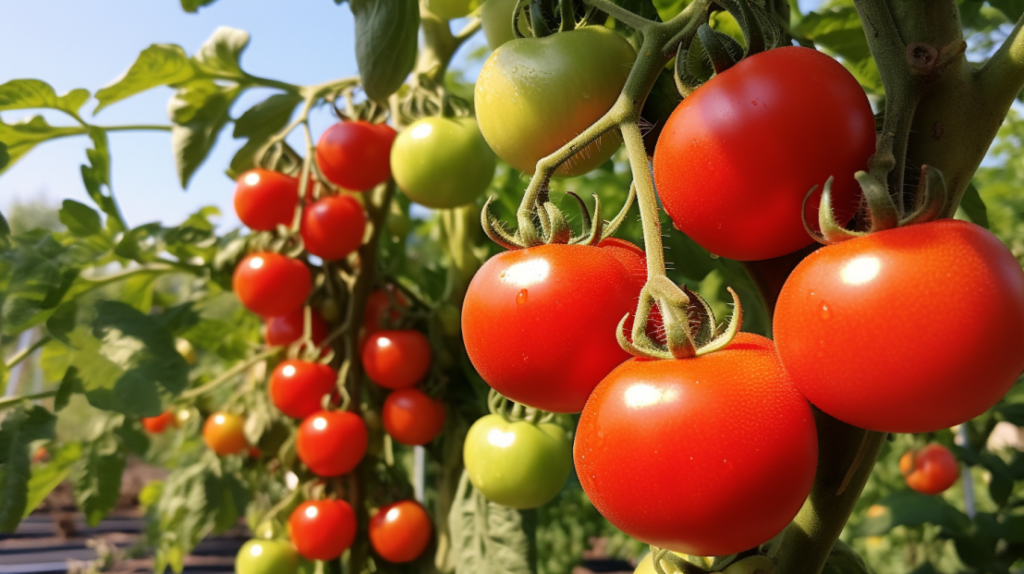Deer can be a common source of frustration for gardeners, especially when it comes to growing vegetables. The sight of your hard work being devoured by these hungry creatures can be disheartening. But fear not! There are ways to protect your garden and enjoy a bountiful harvest of deer resistant vegetables. In this article, we will explore the behavior of deer, identify vegetables that they tend to avoid, and discuss strategies for keeping them at bay.
Key Takeaways:
| ➤ Deer can cause extensive damage to vegetable gardens. |
| ➤ Deer have certain preferences when it comes to their food choices. |
| ➤ Planting deer resistant vegetables can help protect your garden. |
Understanding Deer Behavior and Feeding Habits
Deer are herbivores and their feeding pattern is influenced by various factors such as the availability of food, habitat, and season. While they may seem to eat almost anything, there are certain types of plants that deer tend to avoid. Understanding deer behavior and their feeding habits can help you make informed decisions when it comes to growing your own vegetables.
Deer prefer tender shoots and leaves, making young vegetable plants particularly vulnerable. They are attracted to plants with a high moisture content, such as succulent fruits and vegetables. However, they are less likely to target vegetables that have strong smells, bitter tastes, or tough foliage.
To deter deer from your garden, it is important to identify vegetables that have properties that deer find unappealing. Some common characteristics of deer resistant vegetables include strong odors, bitter flavors, tough textures, or the presence of natural repellents. By planting these types of vegetables, you can minimize the risk of damage to your garden.
Identifying Deer Resistant Vegetables
When selecting vegetables to grow in your garden, it is helpful to know which ones are more likely to withstand deer browsing. Here are some deer resistant vegetables that you can consider:

- Tomatoes: While not completely immune to deer feeding, tomatoes have a strong scent and slightly bitter taste that makes them less appealing to deer. However, it is still a good idea to protect tomato plants with physical barriers or repellents to prevent damage.
- Peppers: Peppers, whether they are sweet, mild, or hot varieties, are generally deer resistant. Their pungent aroma and spicy flavor make them less attractive to these hungry intruders.
- Eggplants: With their strong odor and slightly bitter taste, eggplants are not favored by deer. By planting eggplants in your garden, you can enjoy their delicious fruits while deterring deer from dining on them.
- Squash and Zucchini: These robust vegetables have tough foliage and are less appealing to deer. They are a popular choice for gardens seeking protection against browsing wildlife.
- Cucumbers: The strong scent of cucumber plants, along with their slightly bitter taste, can discourage deer from nibbling on them.
By incorporating these deer resistant vegetables into your garden, you can increase your chances of a successful harvest while minimizing the risk of damage from deer.
Planting and Managing Deer Resistant Vegetables
When it comes to planting and managing deer resistant vegetables, there are several tips and techniques that can help enhance their effectiveness:
- Location: Choose a garden location that is less accessible to deer, such as closer to your house or surrounded by physical barriers like fences or hedges.
- Companion Planting: Some flowers and herbs are known to repel deer. Consider planting deer-resistant companions alongside your vegetables to create a natural barrier. For example, marigolds or garlic can help deter deer while also adding beauty and flavor to your garden.
- Repellents: Using natural repellents can be another effective way to deter deer from your garden. These can include garlic spray, predator urine, or commercial deer repellent products.
- Protective Fencing: Installing a sturdy fence around your garden can be an effective long-term solution to keep deer out. Make sure the fence is tall enough to prevent deer from jumping over it.
By following these tips, you can create a garden that is not only aesthetically pleasing but also less appealing to deer.
In the second half of this article, we will explore additional strategies for protecting your garden from deer and discuss other effective deterrent methods. Stay tuned for tips on how to enjoy a thriving garden while keeping deer at a safe distance.
Strategies for Protecting Your Garden from Deer
In addition to planting deer resistant vegetables, there are several strategies you can employ to further protect your garden from deer. Here are some effective techniques to consider:
Physical Barriers
Installing a fence is one of the most reliable ways to keep deer out of your garden. A sturdy fence at least 8 feet tall can effectively deter deer from jumping over. Choose fencing materials that are difficult for deer to penetrate, such as metal or wire mesh. Be sure to secure the bottom of the fence to prevent deer from squeezing underneath.
Natural Deterrents
Deer have a keen sense of smell, so using scents that they find unpleasant can help keep them away from your garden. Garlic spray is a popular natural repellent that can be applied to the surrounding vegetation. Another option is to hang bars of strongly scented soap or bundles of human hair around the perimeter of your garden. The strong smells will help deter deer from venturing too close.
Motion-Activated Devices
Motion-activated devices can startle deer and discourage them from approaching your garden. Devices such as sprinklers or ultrasonic devices emit sounds or bursts of water when they detect movement. These unexpected stimuli can be effective deterrents for deer and other wildlife. Just be sure to follow the manufacturer’s instructions when installing and using these devices.
Plant Selection and Garden Design
Beyond deer resistant vegetables, incorporating other plants and elements into your garden can help deter deer. Consider planting deer-resistant flowers and herbs as a border around your vegetable patch. Marigolds, for example, have a strong scent that deer dislike. Additionally, incorporating raised beds or elevated planters can make it more difficult for deer to reach your vegetable plants.
Proper Cleanup and Maintenance
Keeping your garden tidy and free from debris can discourage deer from seeing it as a potential food source. Deer are more likely to be attracted to gardens with plenty of hiding spots, so regularly clearing away brush and fallen leaves can make your garden less attractive to them.
By implementing these strategies, you can greatly reduce the likelihood of deer damaging your vegetable garden and enjoy a more fruitful harvest.
In conclusion, protecting your garden from deer is a challenge that many gardeners face. However, by understanding deer behavior, identifying deer resistant vegetables, and implementing effective deterrents, you can create a garden that is less appealing to these browsing creatures. Remember to choose vegetables that have properties that deer find unappealing, such as strong smells or bitter flavors. Companion planting with deer-resistant herbs and flowers can also add an extra layer of protection. Physical barriers, natural deterrents, and proper garden maintenance are essential techniques to keep deer at bay. By combining these strategies, you can have a thriving garden free from deer damage. Happy gardening!
Key Takeaways:
| ➤ A tall fence is an effective physical barrier to keep deer out of your garden. |
| ➤ Motion-activated devices can startle deer and discourage them from approaching. |
| ➤ Proper cleanup and maintenance of your garden can minimize its attractiveness to deer. |
Disclaimer: Remember that deer behavior can vary, and there is no foolproof method to completely prevent them from entering your garden. The strategies mentioned in this article are intended as general suggestions and may not work in all situations. It’s always a good idea to consult with local gardening experts or wildlife professionals for personalized advice and solutions.
Hey there, fellow nature enthusiasts! I’m Mark Gray, the passionate owner of OutdoorAnimals.com, a hub dedicated to uncovering the incredible world of outdoor animals. Whether you’re a hiker, a four-wheeler, or just someone who revels in the beauty of the great outdoors, you’re in the right place. I seek to understand all varieties of animals, from the great elk to the simple mouse, my goal is to write and share this knowledge with the public.

